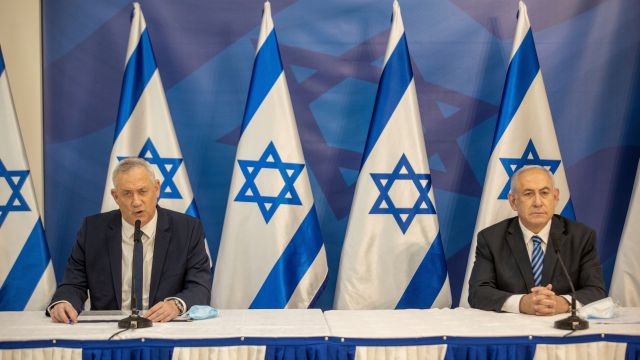In a nationally televised address on Sunday, Mr Netanyahu said that now was not the time to drag the country into a fourth parliamentary election in less than two years.
“Now is the time for unity. Not for elections,” he said.
Israeli Prime Minister Benjamin Netanyahu with coalition partner Benny Gantz (Menahem Kahana/Pool Photo/AP)
Mr Netanyahu and his rival and coalition partner, Benny Gantz, had faced a Monday night deadline to agree on a budget. Otherwise, the government would have collapsed and automatically triggered a new vote.
Mr Netanyahu said that following a historic agreement to establish official relations with the United Arab Emirates, and with the country struggling with a coronavirus outbreak, he felt it was wrong to go to elections.
He said he accepted a compromise that would give the sides an additional 100 days to reach a budget deal, and in the meantime direct spending to struggling areas of the economy and society.
His announcement came after Israeli lawmakers spent much of the day unsuccessfully trying to agree on a compromise.
The current political crisis pitting the prime minister against rival-turned-partner Mr Gantz is ostensibly over the country’s national budget.
But the crisis has deeper roots in the troubled partnership between Mr Netanyahu and Mr Gantz, economic troubles stemming from the country’s coronavirus outbreak and the prime minister’s ongoing corruption trial.
A juggler holds a model in the shape of the Star of David during a protest against Benjamin Netanyahu in Tel Aviv (Oded Balilty/AP)
Critics accuse Mr Netanyahu of using the budget battle to force a new election in hopes of securing a friendlier parliament that could help solve his legal troubles.
After three deadlocked elections, Mr Netanyahu and Mr Gantz reached a powersharing agreement in April to form a government to address the virus crisis.
As part of their coalition deal, Mr Netanyahu’s Likud party and Mr Gantz’s Blue and White agreed to pass a two-year budget.
But Mr Netanyahu has insisted on passing a budget to cover only the remainder of 2020, saying it will provide immediate assistance to the economy.
Mr Gantz is adamant that the government honour its agreement and pass one for 2020 and 2021. Their disagreement has again brought the country to the brink of political meltdown.
The Knesset, or parliament, must pass the legislation in two rounds of voting in parliament before Monday night’s deadline.
But pushing back the deadline would only kick the budget crisis down the road.
If the budget deadline is not deferred, and new elections are triggered, it would plunge the country into political chaos during a deep economic and public health crisis and while the prime minister is on trial for corruption.
Mr Netanyahu is charged with fraud, breach of trust and accepting bribes in three separate cases. His criminal trial began in June, but he has refused to step down from office and denies any wrongdoing.
At the same time, Israel has recorded more than 100,000 confirmed coronavirus cases and more than 800 deaths.







